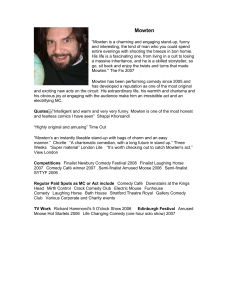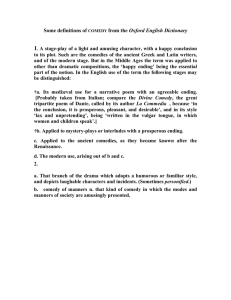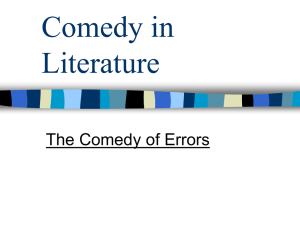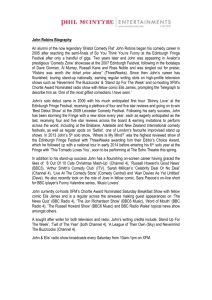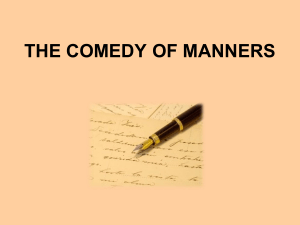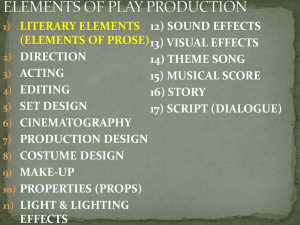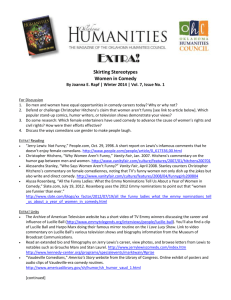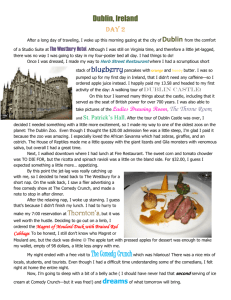Humor in Midsummer Night`s Dream
advertisement
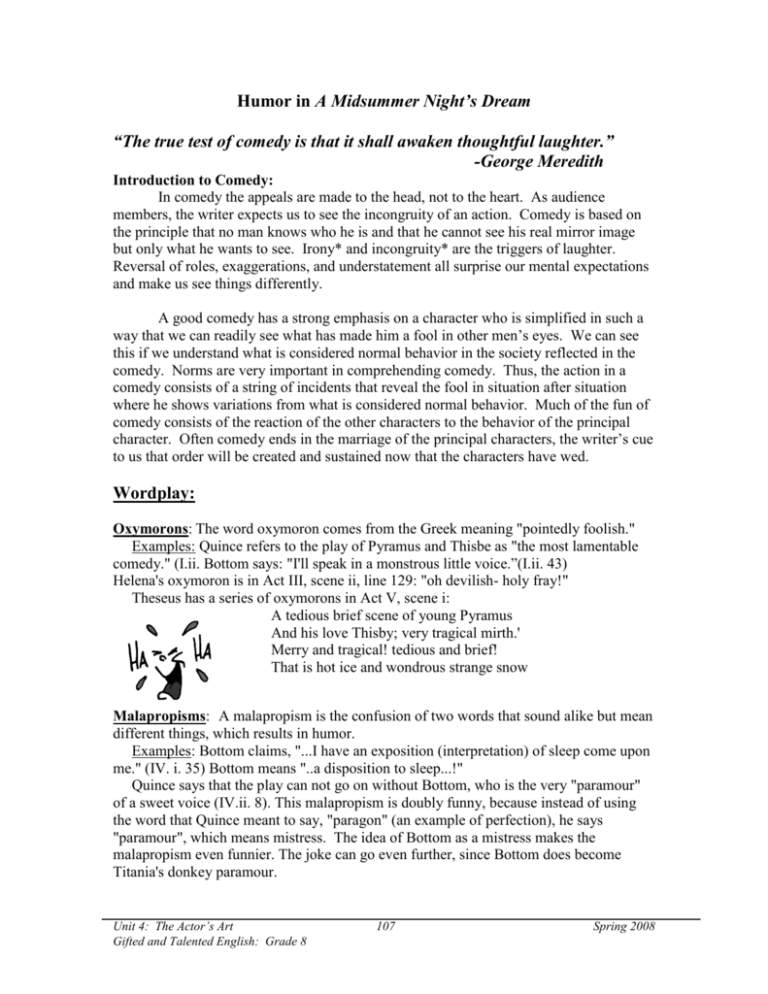
Humor in A Midsummer Night’s Dream “The true test of comedy is that it shall awaken thoughtful laughter.” -George Meredith Introduction to Comedy: In comedy the appeals are made to the head, not to the heart. As audience members, the writer expects us to see the incongruity of an action. Comedy is based on the principle that no man knows who he is and that he cannot see his real mirror image but only what he wants to see. Irony* and incongruity* are the triggers of laughter. Reversal of roles, exaggerations, and understatement all surprise our mental expectations and make us see things differently. A good comedy has a strong emphasis on a character who is simplified in such a way that we can readily see what has made him a fool in other men’s eyes. We can see this if we understand what is considered normal behavior in the society reflected in the comedy. Norms are very important in comprehending comedy. Thus, the action in a comedy consists of a string of incidents that reveal the fool in situation after situation where he shows variations from what is considered normal behavior. Much of the fun of comedy consists of the reaction of the other characters to the behavior of the principal character. Often comedy ends in the marriage of the principal characters, the writer’s cue to us that order will be created and sustained now that the characters have wed. Wordplay: Oxymorons: The word oxymoron comes from the Greek meaning "pointedly foolish." Examples: Quince refers to the play of Pyramus and Thisbe as "the most lamentable comedy." (I.ii. Bottom says: "I'll speak in a monstrous little voice.”(I.ii. 43) Helena's oxymoron is in Act III, scene ii, line 129: "oh devilish- holy fray!" Theseus has a series of oxymorons in Act V, scene i: A tedious brief scene of young Pyramus And his love Thisby; very tragical mirth.' Merry and tragical! tedious and brief! That is hot ice and wondrous strange snow Malapropisms: A malapropism is the confusion of two words that sound alike but mean different things, which results in humor. Examples: Bottom claims, "...I have an exposition (interpretation) of sleep come upon me." (IV. i. 35) Bottom means "..a disposition to sleep...!" Quince says that the play can not go on without Bottom, who is the very "paramour" of a sweet voice (IV.ii. 8). This malapropism is doubly funny, because instead of using the word that Quince meant to say, "paragon" (an example of perfection), he says "paramour", which means mistress. The idea of Bottom as a mistress makes the malapropism even funnier. The joke can go even further, since Bottom does become Titania's donkey paramour. Unit 4: The Actor’s Art Gifted and Talented English: Grade 8 107 Spring 2008 Puns: A pun is a deliberate play on words or well-known expressions that carry a double meaning. Puns are often categorized as low comedy because they are sometimes considered “corny” and elicit groans. However, they do require a knowledge of vocabulary. In A Midsummer Night’s Dream, Bottom is magically changed into a man with an ass’s head. He is unaware of this transformation, however. His friends see him and run from him in fear. Bottom responds, “I see their knavery. This is to make an ass of me, to fright me, if they could.” The pun is that “ass” refers not only to the literal animal whose head Bottom now wears, but also to the other meaning of “fool.” *Incongruity: When something is illogical or out of place. Incongruity is one of the essentials of comedy and there is no more incongruous situation in literature than that of Bottom-with his ass's head and "fair large ears"-asleep in the arms of Titania. *Irony: Irony is an incongruity between what might be expected and what actually occurs. For example, it’s ironic that Bottom’s name is Bottom when in actuality, it is his head that is transformed. The Comedy Ladder Few comedies are purely one form or another, but rather a blend of types. Some mix farce with low comedy and then lurch toward comedy of ideas and back to comedy of manners. Some television shows and films rely on one type of comedy but use the others to a lesser degree. Comedy of Ideas: Characters argue ideas like politics, religion, sex, marriage, government. They use clever language to mock their opponent’s ideas. Institutions are often satirized to provoke change. Comedy of Manners: Witty insults are traded between characters; focuses on clever language. Upper-class characters are falling in and out of love while other characters are commenting wryly on the actions. Farce: The plot is full of coincidences, mistimings, and mistaken identities. Characters are often puppets of fate, controlled by situations like class, gender, wealth, lovers, domineering parents, etc. Farce uses devices like twins who are separated, characters in disguise or other tricks where a character’s identity is confused. Low Comedy: There is exaggeration or understatement of human physical qualities: long noses, short and tall, pretty and ugly, fat and skinny. Loud noises, collisions, physical mishaps, slapstick, and pratfalls are part of the humor of characters who encounter an uncooperative universe. Unit 4: The Actor’s Art Gifted and Talented English: Grade 8 108 Spring 2008
